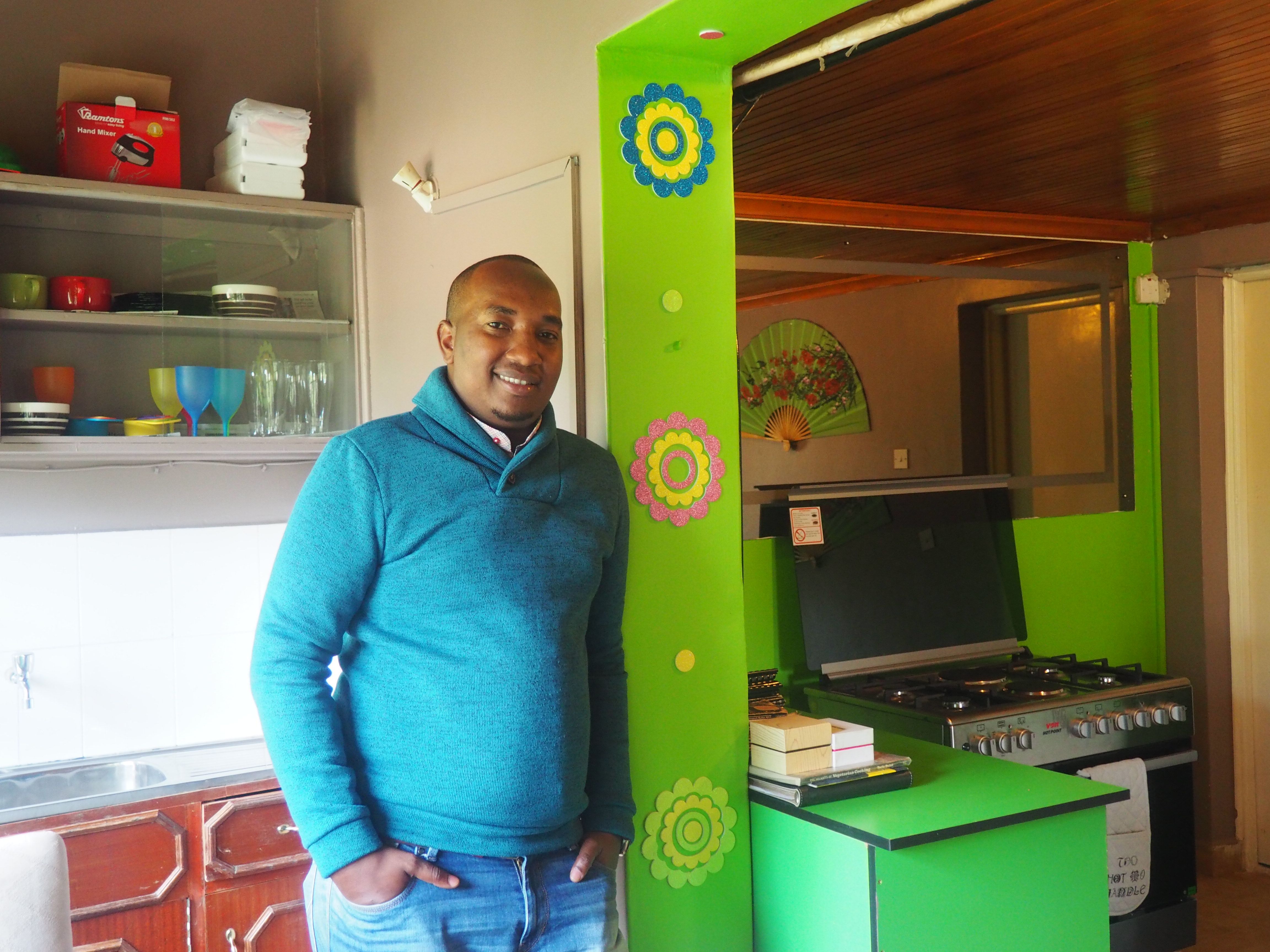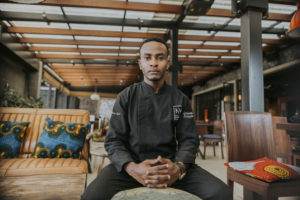BY FLORENCE BETT
March ‘17
I find him waiting at the dining table. He’s doing something on his laptop, maybe sending an email. He’s wearing a warm sweater and this makes me feel even hotter, he’s like a radiator.
Allow me to introduce him to you: Meet Chef Ken Maina Ndirangu. (I’ll refer to him as Chef Ken throughout the story so get used to the weight of the title.) He’s 31.
Chef Ken teaches regular folk like you and I how to cook fancy non-local dishes using non-fancy local ingredients. It comes at a small fee, of course. He’ll also teach you how to buy ingredients to match the portions you want to cook, how to interpret a menu, how to plate the dish you’ve prepared, how to lay it out on the dining table and advise you on what wine to pair it with.
You choose what you want to cook from ten different cuisines and also choose the number of classes you want to take. (I’ve listed the packages all down below.) I already mentioned that it comes at a small fee, yes? He’ll provide all the cooking materials you need.
“Lemon Grass Fun Cooking Class will refine your palate,” Chef Ken promises.
He adds, “Aside from the cooking classes, I’ve also consulted with restaurants to help them generate their menus; restaurants like Sirville Bistro, After 40 Hotel and others.”
***
It’s noon. It’s as if the sky has cracked open today to let down large unforgiving shards of sunlight and sunshine. It’s uncomfortable to be out. I’m rocking a sweat mustache and I’m feeling darn good about it. I’m on Dennis Pritt Road driving up from Hurlingham and I swear I can mirages appearing and disappearing on the road ahead. I’m on my way to meet Chef Ken at his premises on Likoni Road, off Dennis Pritt Road.
Traffic is thin and the day had taken on this sluggish yawnful tone that marks the pocket where the day rolls over from morning to afternoon. It’s a pocket that hinges delicately on this easy-to-lose balance of what’s on your plate, a pocket that could easily turn a good day into a great day. Or a bad day into a worse one. The secret to grasping these fickle moments is by being alert to them and keeping yourself open to the elements of the Universe. Staying woke, if you may.
Chef Ken had told me to watch out for a landmark on the turning into Likoni Road, “you’ll see a mathe under a red Jubilee umbrella selling bananas, you can’t miss her.”
I don’t.
Chef Ken’s, uhm, workplace is one of those old single-storey apartments that were built as an afterthought and extension to the main house. It’s a one-bedroom and has a steep flight of concrete stairs leading up to his door. It has the distant feel of Melrose Place, suburbia and Moi. Oh, plus a little of Biwott.
***
Before we sit down to chat, Chef Ken shows me around the place: what was essentially the living room of the quarters has a workstation to one side of the green wall and a well-stocked spice rack to the other. Everything is arranged with their labels facing forward and the same distance of spacing between them. You know what they say about a cluttered space and cluttered mind. There are also some dog-eared cooking manuals here. A six-burner cooker with an oven sits along the adjoining wall. The squat refrigerator is stuffed to the other end, Chef Ken opens it and shows me inside.
“Why’s it empty?” I jump in and ask.
“Because I already had my client for the day,” he says, “she came in at 10 and used up what I’d bought. I buy all my ingredients from the grocery and the supermarket at Yaya. I like their stuff. I buy them fresh every morning depending on the clients I have for that day and what we’ll be cooking. I’ve learned how to buy just enough for what they need, so there’s no wastage.”
“What about the things they’ve cooked, where does that go?”
Chef Ken says, “Well, they can either eat it here or pack it to-go. That’s what the dining table is for. Plus, remember I teach them how to plate it? Yeah, it’s so that they can eat it up. We don’t keep any cooked food here.”
He proceeds with the tour. “This here is the wine rack. I want to start stocking wines because wine goes well with food, but you must know how to pair what wine with what food. I’m still looking for a supplier for the wines.”
Chef Ken speaks in a guttural bass voice, it’s like there’s something stuck in his throat but he doesn’t want to clear it.
We move on to the next room. What was the bedroom has six working stations and another six-burner cooker. Each of the workstations has a laminated tabletop and a wooden chopping board atop. It’s spare and simple.
Chef Ken’s one employee – a young-ish chick who looks like she comes from Kakamega – does all the cleaning. She’s idling in a corner and removing dirt or something from under her fingernails. For some reason, she’s taken her shoes off and is paddling around barefoot on her tippy toes. Her feet don’t make a sound on the floor.
He and I return to the dining table to chat.
***
“So where did you get this idea for Lemon Grass from,” I ask, “this idea about teaching people how to cook?”
Chef Ken says, “So, in 2012, I’d been out of work for about seven months. I was living at my friend’s place off his couch and used this beloved laptop of mine,” he pats it as if it’s a favourite fuzzy pet, “to come up with the concept. I didn’t want to go back into employment, and I’d seen that there was a niche in the market for this kind of service. The middle class was growing and they were eating out a lot. The term ‘foodie’ was being thrown around and social media was a hit so everyone wanted to share and take photos of their food and say they ate this here and that there.”
“All thanks to the Internet, aye?”
“Yep,” he says. “All thanks to the Internet.”
“And are you trained as a chef? Ama we’re calling you Chef because it sounds cool?”
We chuckle briefly.
“Yeah, yeah,” he says. “I went to the culinary school at Utalii in 2005 to train as a chef. It’s something I wanted, yes, I chose the course myself. Back then Utalii was Utalii and the chefs that were graduating had a real passion for food and cooking. Before I graduated in 2007, I relocated to S.A [South Africa] to work as an intern. I was 21. I worked at Intercontinental Hotel for three months then in The Palazzo Hotel for another three. Both of them were five-star restaurants with continental cuisines. Johannesburg has a vibrant eat-out culture and the clientele really understand their dishes.”
“Did you have like, a mentor where you worked, someone to hold your hand as you learned you way around the kitchen?”
“Yeah, the executive chefs at the restaurants. The one at the Intercont was German, and the one at Palazzo was South African. The German taught me a lot – about preparation, quality control, standardization of the dishes, tasting before serving… He always inspected all plates before they left the kitchen. Every morning, he’d call me to his office and we’d go through the menu.” Chef Ken offers a small smile at the memory. It’s heart-warming, really. “He was a good man.”
“And what did you like to cook?” I ask.
“Meats!” he says without skipping a beat. “So every kitchen has four departments – saucier, entree, pastry and garde manger. Saucier, or a sauté chef, is the one for meats and sauces, that’s where I excelled as a chef. I loved to prepare t-bone steak and spare pork ribs.”
“Did you ever get a compliment from one of your diners, about a meat dish you’d prepared?”
Chef Ken pauses to think. “Yeah, I actually did, for a medium rare rib-eye steak I’d prepared at The Palazzo. The diner even asked to see me and I went over to his table. But I also believe that the meat cut and the age of the cow favoured me.”
“What did those few months in S.A teach you?”
Reflectively, Chef Ken says, “S.A taught me what it meant to experience food as a journey. And not just as a chef but also as a diner. South Africans like to eat out a lot but their prices of food in restaurants are not as high as they are here, so you can afford to eat at most five-star restaurants in Jo’berg. Plus I mentioned that they know they’re dishes very well, that added to my experience.”
***
Chef Ken returned to Kenya that August of 2007. He graduated then had a string of stints with kitchens across the city – Tribe Hotel, the Army Barracks – before working for two years as Sections Department Head with KCB Utalii Cooking Grounds. “I was preparing pilau, muthokoi, beef stew and other basic dishes which feature in Kenyan weddings and other events,” says Chef Ken. We laugh out aloud.
He continues, “In any one event, I was cooking for between 200 and 500 people. I left the job because it lacked the creativity I needed to thrive. But it taught me to work under pressure, that one I give it marks, I can’t lie there,” he giggles, “and also how to manage a team of chefs in the kitchen. After that, I moved to a clearing and forwarding company near the airport, I was the Head Corporate Chef. It was run by some tycoon.”
Chef Ken goes into a blow by blow about how things were run there and the tyranny of the big boss, a greedy heartless bastard that had the sense of humour of Idi Amin. No one was happy working there. Chef Ken quit in late 2011 and didn’t even get his final dues in full. He gave them the middle finger and that’s how he ended up with no financial footing and living off his his friend’s couch. It was when shit had hit the fan seven months in to 2012, in August, that the idea for Lemon Grass Fun Cooking Classes came to him.
“I got a partner who had agreed to go in with me 50/50,” Chef Ken continues. “I’d shown him the concept and explained to him the idea and he liked it. I needed 150K to start off but he pulled out at the last minute saying he didn’t believe that my concept would sell. So I went ahead with the half I was able to raise and borrowed the rest from my Dad. I later paid him back.”
“How did you invest this capital?” I say.
“80K went to deposit plus one month rent for my premises, it was my bed-sitter in Kilimani, I actually used to live there. I remember after I started getting clients, I used to clean up and wash the dishes then I’d remove the mattress from some kabati there and put it on the floor to watch movies on my laptop and sleep.” Chef Ken snickers. “There was a client who once saw the mattress and asked me about it and I told her that the guy who had been living there before had forgotten it.” We laugh until Chef Ken’s laughs turn into coughs then to longer and harder coughs.
“My goodness, are you OK?” I ask, slightly alarmed.
“It’s the dust,” he says, coughing, “that’s making it,” cough, cough, “hard to breath. I’m asthmatic,” cough, cough, cough, “and I forgot to,” cough, “carry,” cough, cough, “my inhaler.”
Aha, that explains the sweater and that stuck-in-my-throat voice. I want to give him some first aid but I’m not exactly sure what to do. I sit it out and watch him cough his lungs sore. I feel evil.
He catches his breath after a few minutes and continues, “So 80K gone and I’m left with 70K. I took 10K to Nakumatt and bought two table-top cookers and one table-top oven. Si now I have 60K left and I need dishes and sufurias and things to cook with? You know huko ndani Toi [market]? Ha-ha. Yeah, I went there and bought everything I needed, used and second-hand.” He adds, “Yeah, they were good quality. They served me until I was able to upgrade and buy brand-new ones from the supermarket later.”
Chef Ken got his first clients that June. “I got a friend and she came with her friend. I charged them 30K each for 20 classes. Back then I was only offering classes on cooking from the French menu. My classes were – and still are – flexible, so they picked the time they would come.” He points out, “They gave me hope that my concept could actually work and that I could make money and live off it.”
This first pair referred another pair, which referred four other people. Numbers per month grew from four to six then to 15 by the end of 2014. The clientele was mostly female, Chef Ken says, between the age of 21 and 35 years – single girls and newly-married women. (That suggests something, doesn’t it?) Male clientele grew in 2015.
“And do you hold the classes anywhere else?”
“No way,” Chef Ken says with emphasis. ““I only hold them here – we don’t do it at the client’s home or at their place of work or sijui outdoors. There’s a competitor who told me she used to do her classes at home but it wasn’t working out for her family.”
He continues, “The client can choose the hours he wants to do the class, it’s anytime between 8AM and 7PM. Each class runs for an hour. There is a start date for the classes but there is no end date, as long as they complete what they paid for. Payment plan is half deposit when you start and complete payment when you’ve done half the classes.”
“Do you cook to music?” I nod at the Beats Pill on the table.
“Oh, yeah!” he says, once again tapping it with some odd affection. “My clients also work to music. Music is relaxing and adds to the romantic ambience of preparing food.”
“What’s your favourite genre of music?
“Jazz.” He smiles at himself.
“You must be such a great lover then,” I ask, cheekily, “with your music and your cooking?”
We laugh hard. “Well…” he says, rather comfortably, “we broke up with my fiancé but I used to cook for her.” It’s here that Chef Ken, once again, goes into a blow by blow of the relationship that were – guided by my prodding questions, of course – and even shows me photos on his laptop of his elaborate romancing and mawkish gestures of love. Good food and good wine does things to people – it unlocks them and opens them up to love.
I ask, carefully, “In 2022, five years from now, work back for me where you envision you and your business will be.”
“So, in the next two years I want to open my own restaurant plus a fully-fledged culinary institute. It is a profitable and sustainable business.” Chef Ken adds, “I mean, we kicked off in 2013 and by 2015, revenue had more than doubled to about 7M. 2016 wasn’t a good year for business so we closed for six months. But I got calls from my old clients and some of my competitors to open up again, which we did in December. I’m hoping to have a better year in 2017 because of the new packages I’ve introduced. We just hope that everything goes well with these Elections.”
***
October ‘17
Well, as you may have heard in the news, things didn’t go as well as we’d hoped for with the Elections. What with nullified presidential results and court-ordered fresh polls and the silent treatments and dusty rugs being pulled from under our feet and cops wildly shooting anything in a protest that moves, including their own toes if they wanted.
I couldn’t reach Chef Ken on phone earlier this week so I WhatsApp’d him. He’s one of those chaps that’s opted out of having their messages blue-ticked, so I’m left hanging with the question of, has he read my messages or not?
“Are you still running the business?” I say after some brief niceties.
“Hey I’m in UG,” he types back, “got a consultancy job here for a chain of hotels (sic) been handling that for like 3 months now. I was closed for 3 month’s (sic) 1st week of Dec I’m back end of Nov. Needed to give this consultancy full attention. So no worries.”
Of course, no worries.
***
What Lemon Grass offers
Regular cooking classes
+ Fun cooking classes: Running arbitrarily for one to two weeks
+ 10 classes: One to two weeks
+ 25 classes: Three to four weeks
+ 45 classes: Two to three months
+ Price range: Depending on the duration, between Sh10,000 and Sh50,000
Cooking classes for ‘Date Night’
+ Sh5,000 per couple, main course only plus a complimentary bottle of wine
+ Sh1,500 extra for each desert and each salad
Cooking classes for ‘Girls Night Out’/’Chama’/’Baby Shower’/’Bridal Shower’
+ Sh2,500 per person, main course only
+ Sh1,500 extra for each desert and each salad
+ Maximum number of people per group: 15
Cuisines to choose from
+ Italian
+ Mexican
+ Thai
+ Indian
+ Chinese
+ Japanese
+ Spanish
+ Lebanese
+ Australian
Photo credits: Except feature image, all others are courtesy of Chef Ken, by Felix Okaka
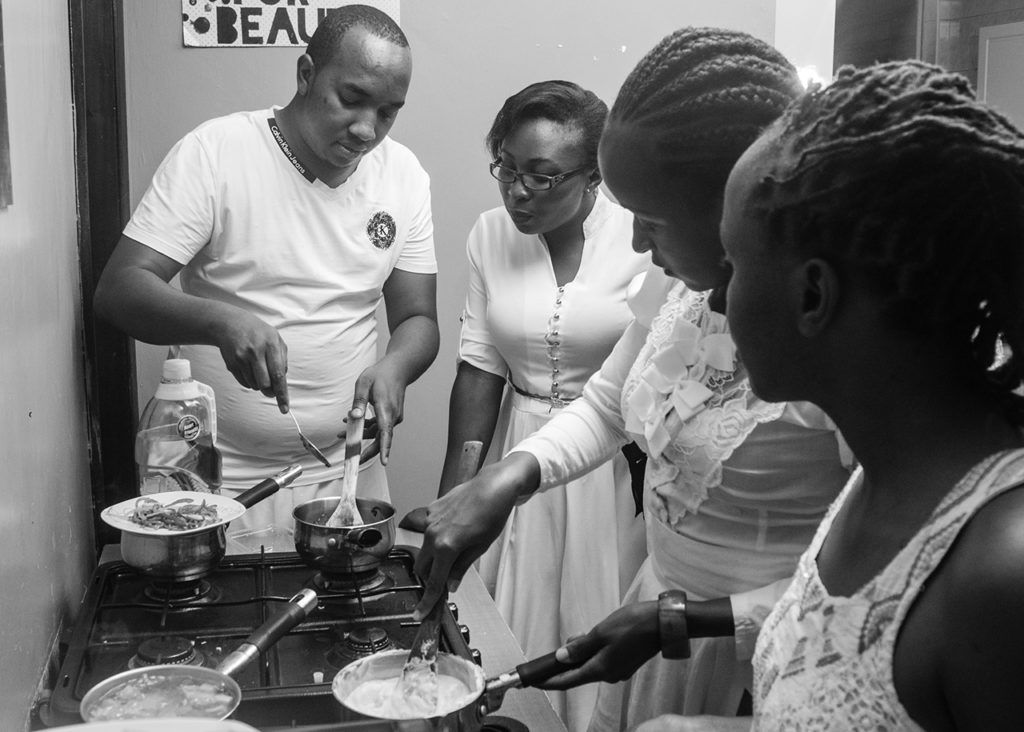
Chef Ken and some previous clients during a class
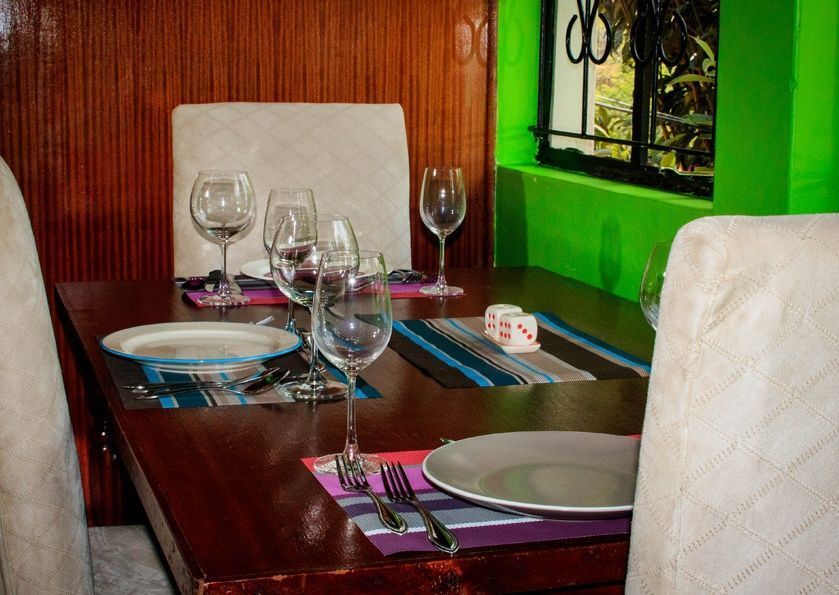
The dining area at Lemon Grass’s premises
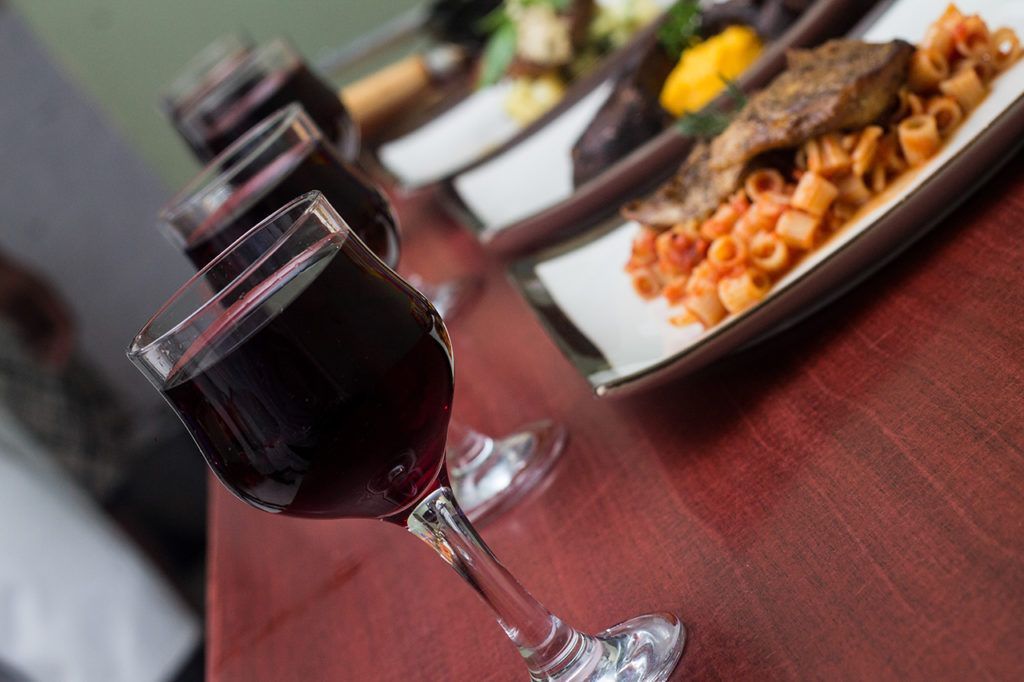
Some of the dishes he’s taught his clients to prepare
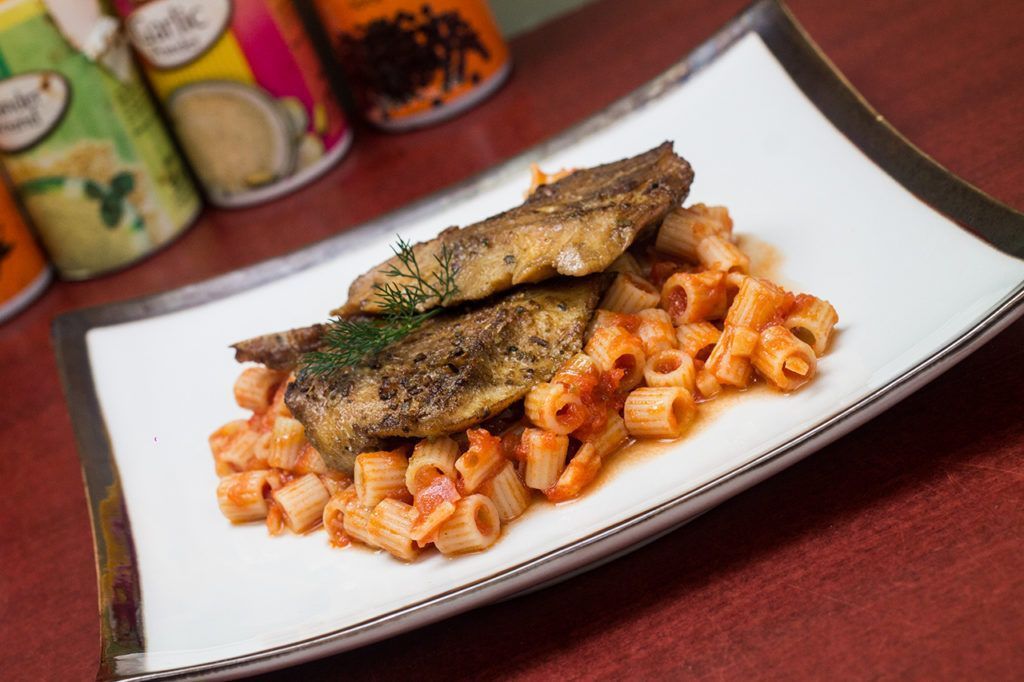
Some of the dishes he’s taught his clients to prepare
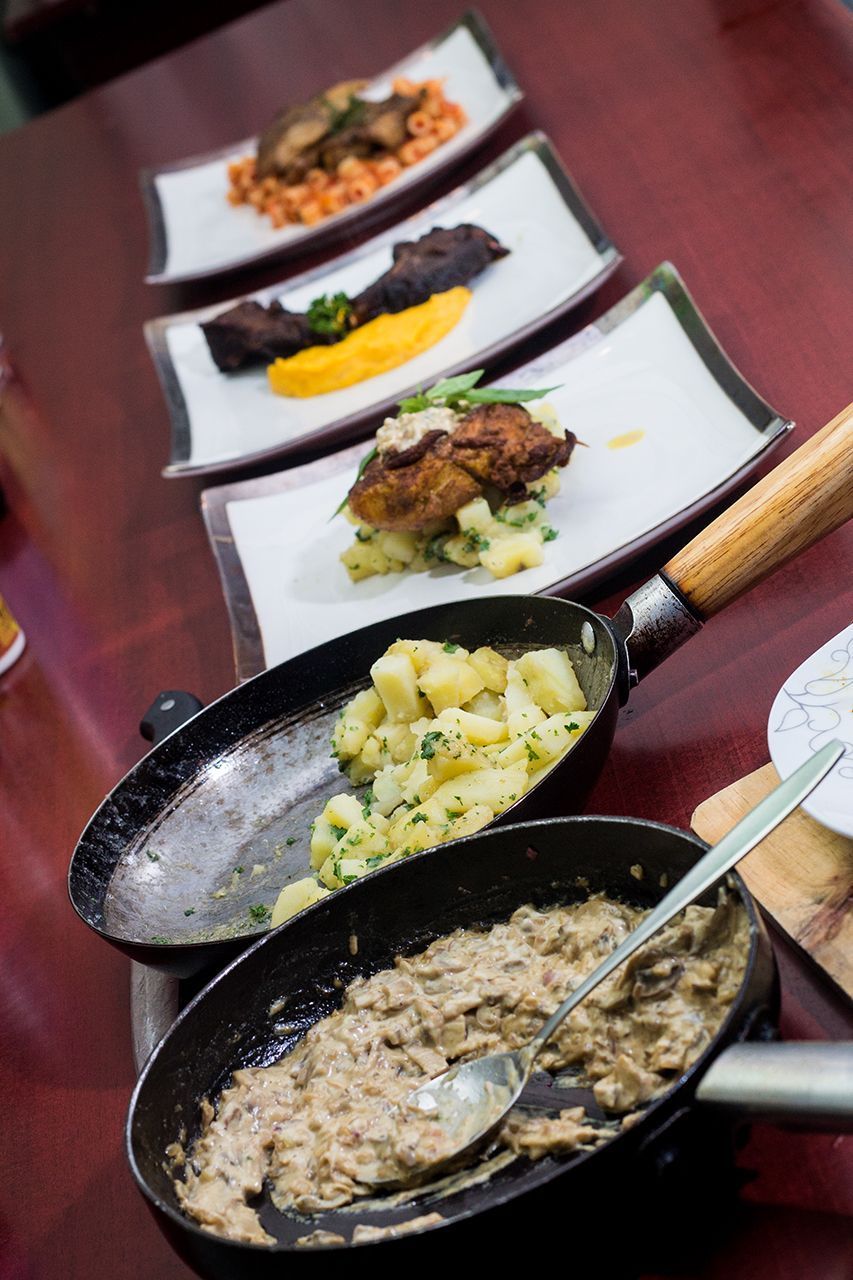
Some of the dishes he’s taught his clients to prepare

